How LGBTQ+ hate crime is committed by young people against young people
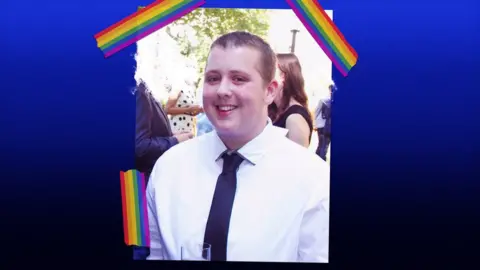 Alex Jones
Alex JonesAlex Jones has a pair of headphones that completely covers his ears.
"If I'm ever out and about I usually wear them," he says. "So I don't hear anything transphobic."
Alex came out to his friends and family as trans in 2013 aged 15. He describes it as an "empowering" move - but claims that he was bullied more at school as a result.
He says that he started receiving a steady trickle of slurs like "tranny" from anonymous accounts on social media.
If the map does not load click here
He claims that one person started being openly hostile, insulting him to his face and sending him abusive messages.
"You're a tranny," one of the messages allegedly read. "Nobody will accept you," he claims another said.
Alex did his best to avoid her. Then one day, in Cwmbran town centre, the situation turned violent, he claims.
"I was hugging another friend," says Alex, now 21. "And as I turned around she was just stood there. And that's when she hit me."
Alex called the police. He says that he went to the station to give a statement, asking them to record it as a transgender hate crime.
'Vastly underreported'
"There were several witnesses. [But] the police just dropped the case. They never explained why.
"It made me not trust them," he adds.
Gwent police confirmed that they initially logged a crime report for a violent transgender hate crime - but that the caller "later confirmed that they did not believe they had been targeted because of their gender identity".
Alex disputes this claim.
"The incident was fully investigated but without independent evidence to support the case, the decision was made that it would not be possible to proceed," a spokesperson for Gwent police said.
Alex's case highlights wider uncertainties around the way police treat hate crime, which has risen significantly over the last four years - in part thanks to major improvements in reporting and recording.
Some police forces say that they are still "vastly underreported" across the UK, however.
BBC Three and the BBC's data team analysed four years of data on homophobic and transgender hate crimes provided by 38 police forces.
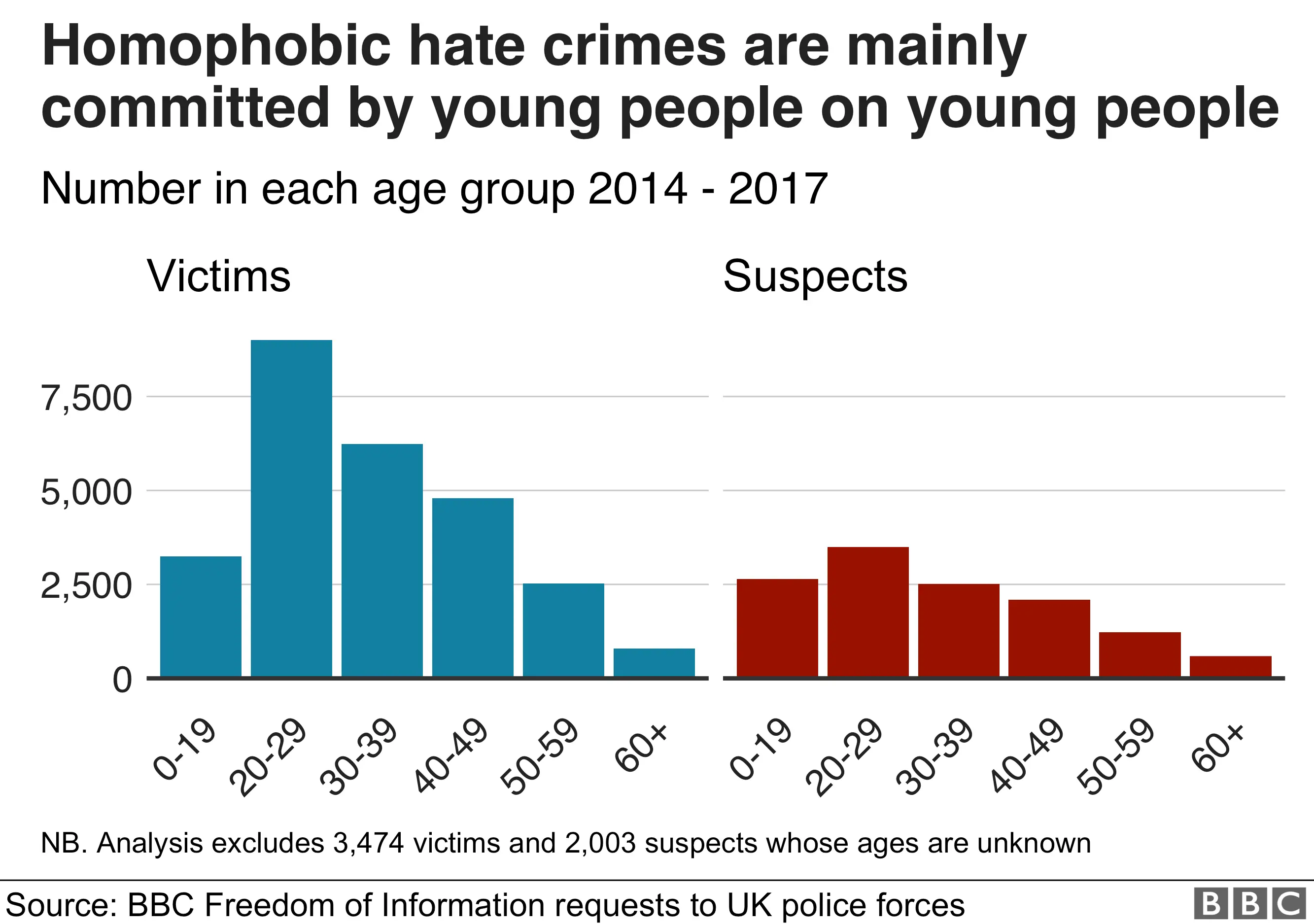
According to the data, 20-29 year-olds are the age group most likely to report being victims of homophobic or transgender hate crime.
The data show that people in their 20s are accused of homophobic hate crimes more often than any other age group. Suspects in transgender hate crimes tend to be teenagers or even younger, according to the numbers.
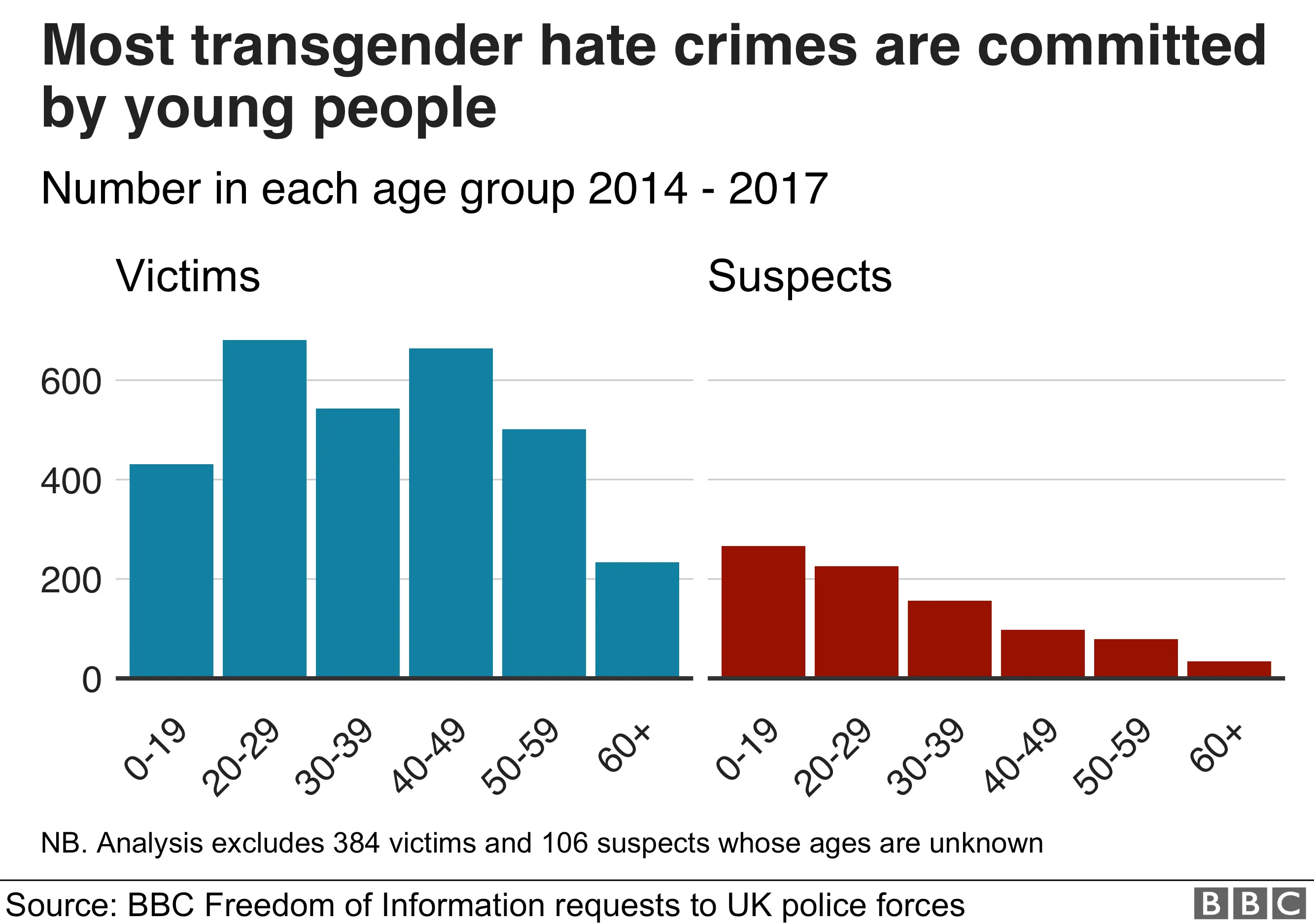
The figures show that 70 children aged under-13 - including some younger than seven - have been reported to police for homophobic or transgender hate crimes since 2014.
Changes to the way police record crimes have contributed to a two-thirds rise in records of homophobic hate crime and a rise in transgender hate crime of one and half times over the last four years.
But the increase hasn't been mirrored by an improvement in the number of crimes solved. Just one in eight (13%) recorded homophobic hate crimes resulted in a charge in 2017 - down from almost one in four (23%) in 2014.
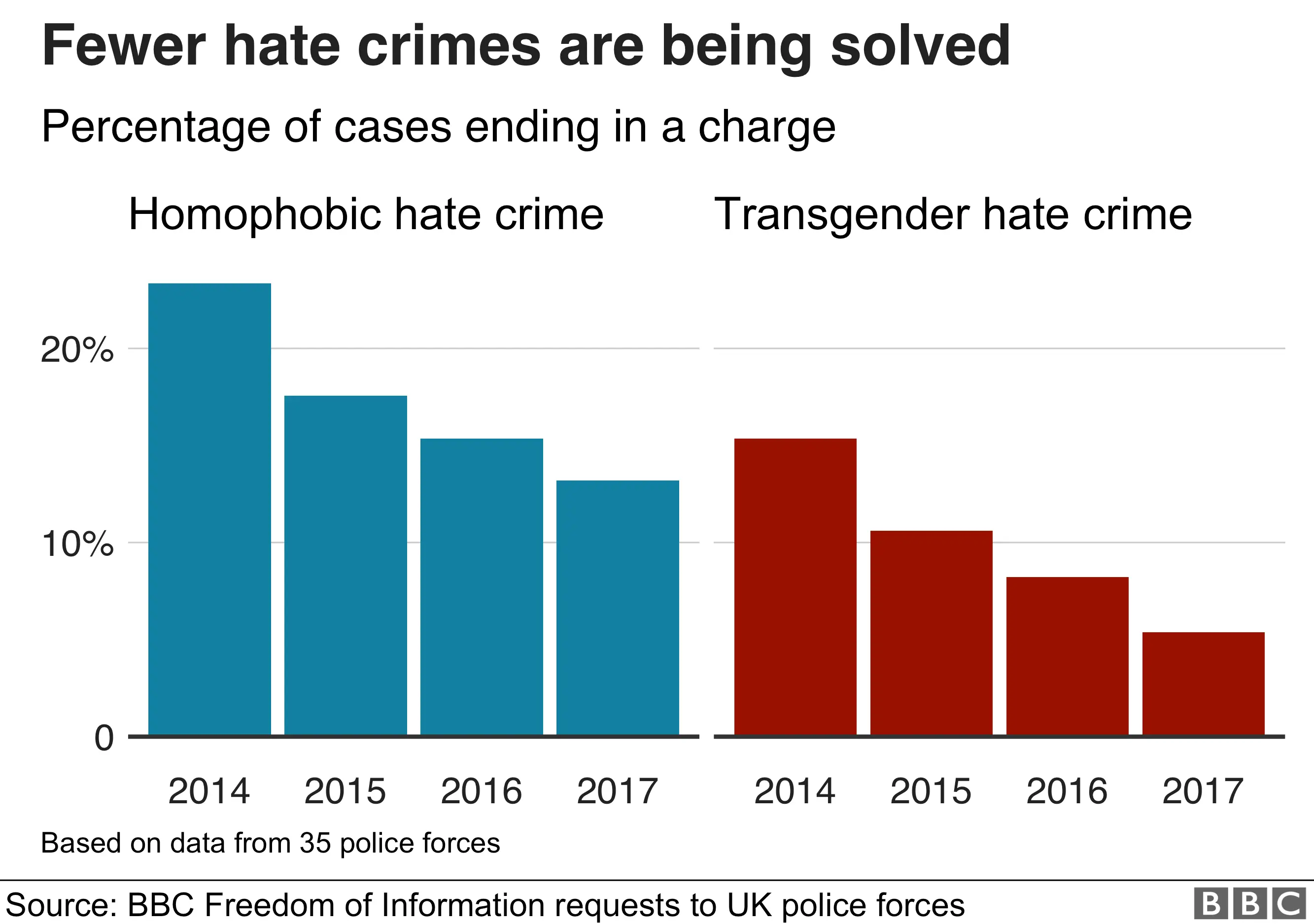
An overwhelming majority of the cases in the records for 2017 were closed without resolution. This was usually because of a lack of evidence or a failure to identify a suspect, according to the data.
Dr Stevie-Jade Hardy, an Associate Professor in Hate Studies at the University of Leicester, said the rise in all kinds of hate crime over the last four years is probably down to police improvements in recording and better reporting by the public.
She cautioned that under-reporting is still significant, however - and "especially acute" when it comes to homophobic and transphobic hate crime.
"Our research suggests that there's layers of resistance to reporting including the normalisation of experiences, the perception that reports will not be taken seriously, and fear of being 'outed'," she said.
It's possible that changes to society have also contributed to the rise in hate crimes, she added. This year the government launched a consultation on the Gender Recognition Act following calls to make it easier for individuals to change their legal gender.
The event was one of a number that revealed "pervasive hostility" towards the trans population, according to Dr Hardy.

You may also be interested in:
The data is from Freedom of Information responses received from 38 police forces across England, Scotland and Wales.
They show that Merseyside has the highest rate of recorded homophobic hate crimes, followed by West Yorkshire, South Wales and Leicestershire.
The areas with the highest recorded rates of hate crimes are not necessarily the most hostile environments for LGBTQ+ individuals.
According to Dr Hardy, some forces are better at recording hate crimes than others. Specialist training for frontline officers, and campaigning to improve reporting, can also have an impact.
"Additionally, the drivers behind acts of homophobic and transphobic hate crime may differ from rural environments to urban areas," she says.
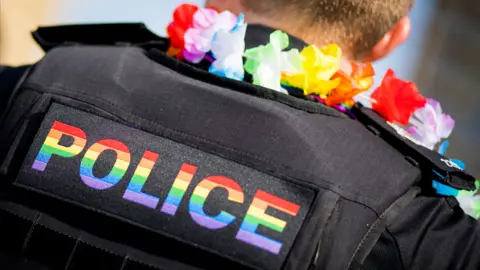 Getty Images
Getty ImagesMichael Robinson, a 28-year-old care home worker from Merseyside, was the victim of a homophobic hate crime at work in 2015 - when a colleague verbally abused him.
"She confronted me in the middle of the lounge where residents, staff and family were present," he said.
Michael's colleague shouted a string of homophobic slurs and threatened to beat him up.
He went to the police who recorded it as a hate crime and opened an investigation. It led to the dismissal of his colleague. Michael declined to take the criminal case further.
Merseyside police said that hate crimes are "vastly underreported" across the UK, and that it has taken steps to improve this state of affairs - such as training hate crime officers in new skills to treat victims appropriately.
"We're proud that we have developed a really positive relationship with the LGBTQ+ community and partners, and believe that this supports the higher level of hate crime reports received by the Force," said Assistant Chief Constable Julie Cooke.
'Minority of people'
Ben Hodge is an 18-year-old transgender activist from Liverpool. He says that although he has experienced intimidation and abuse, he has never reported it to the police.
"It happens on the bus quite a bit," he says. "In Liverpool you get a lot of young lads - and by young I mean primary school age - hanging out."
He recalls an incident on the bus when he was confronted by some children who he says were "11 or 12" years old.
"They walked up to my face and said, 'Are you a boy or a girl? I think we deserve to know.'
"They were five or six years younger than me. But if three of them teamed up they could still do some damage."
Ben didn't report this to the police because he says they "didn't really do anything to me".
He says he often experiences incidents that are uncomfortable but he does not consider serious enough to warrant a report. Liverpool police station can also feel "intimidating", he adds.
Despite this, Ben says that Liverpool - which hosts events including a free Pride festival, and a Transgender Day of Remembrance Vigil - is an LGBTQ+ friendly city.
"The minority of people who commit these crimes are ruining it for the majority," he says.
Any existing criminal offence can be a hate crime if it is considered to be motivated by prejudice. In total more than 90,000 hate crimes of all kinds - including race, religion and disability - were recorded by police in the year ending March 2018.
The rise in offences has been driven largely by a sharp increase in Public Order offences - a category of offence that relates to behaviour in public, including threats, harassment and verbal abuse.
 BBC Three
BBC ThreeWhile some regional police are working to improve hate crime reporting, some of the country's most senior police officers have criticised a proposal by Home Secretary Sajid Javid to widen the definition of hate crime to include categories such as misogyny, ageism and misandry questioning the value of pursuing such crimes if it is at the expense of others.
Overstretched police now have less time to focus on "genuine crimes" such as burglary and violence, according to Sergeant Richard Cooke, chairman of the West Midlands Police Federation.
Police chiefs say that funding in England and Wales has decreased in real terms by nearly a fifth, and there are 20,000 fewer officers.
For people like Alex - who says his trust in the police has been affected - it is vital that potential hate crimes are taken seriously.
"I wouldn't want what happened to me to happen to anybody else," he says. "Other transgender people should know that you can't say or do stuff that victimises other people [just] because they're different.
"The number of hate crimes has gone up, and that means the police have to do something about it."
Gwent police said they have a team of "over 30" specialist Hate Crime Support Officers.
Detective Chief Superintendent Mark Warrender, Gwent Police's lead for hate crime, who also chairs the Hate Crime and Criminal Justice Board Cymru, said: "The increase we have seen in recorded anti-LGBT hate crime in Gwent is due to a number of factors, including regular training for officers, increased hate crime awareness within communities, and improved confidence in reporting."
Additional reporting: Natalie Ktena and Hannah Price
Editing: Serena Kutchinsky
Video producer: Olivia Le Poidevin, Camera/editor: Tom Werber, Picture design: David Weller
